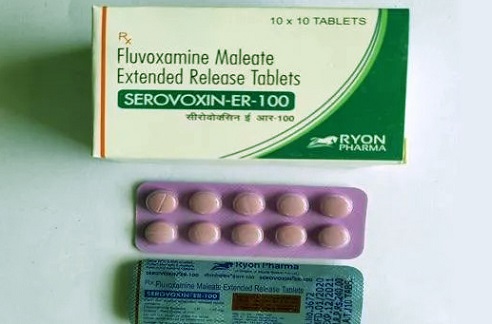Antidepressants Like Fluvoxamine, Bupropion, Escitalopram, Paroxetine, and Trazodone Causes Mitochondrial Dysfunction!
Nikhil Prasad Fact checked by:Thailand Medical News Team Nov 06, 2024 5 months, 1 week, 4 days, 23 hours, 58 minutes ago
Medical News: Recent studies from the First Faculty of Medicine at Charles University and General University Hospital in Prague have raised concerns about how commonly prescribed antidepressants affect mitochondrial functions. Researchers Matej L’upták, Zdeněk Fišar, and Jana Hroudová explored the impacts of various antidepressants, such as selective serotonin reuptake inhibitors (SSRIs) and non-SSRI medications, on mitochondria. By focusing on drugs like fluvoxamine, bupropion, escitalopram, sertraline, paroxetine, and trazodone, the team revealed notable mitochondrial disruptions that could potentially relate to adverse effects and diminished therapeutic responses in patients with depression.
 Antidepressants Like Fluvoxamine, Bupropion, Escitalopram, Paroxetine, and Trazodone
Antidepressants Like Fluvoxamine, Bupropion, Escitalopram, Paroxetine, and Trazodone
Causes Mitochondrial Dysfunction
This
Medical News report delves into the details of the study, exploring how these antidepressants affect mitochondrial complexes essential for energy production and overall cellular health. Mitochondria, known as the "powerhouses of the cell," are responsible for generating adenosine triphosphate (ATP), the energy currency required for cellular functions. When antidepressants interfere with these processes, the implications extend beyond energy disruptions, potentially influencing brain health and the nervous system’s stability.
Understanding the Role of Mitochondria in Brain Health
Mitochondria provide energy to cells by utilizing oxygen in the electron transport chain (ETC), a series of protein complexes responsible for ATP production. They also help regulate cellular metabolism, calcium balance, and the production of reactive oxygen species (ROS). Disruptions in mitochondrial function can lead to neurodegeneration and impact neurotransmitter balance, critical factors in mood disorders such as depression. For patients with major depressive disorder (MDD), mitochondrial dysfunction has been increasingly linked to both the disorder itself and the response to treatment.
The Study’s Methodology and Key Findings
The researchers used pig brain-isolated mitochondria to study how these antidepressants affect the ETC and specific mitochondrial enzymes. They measured changes in ATP production, mitochondrial respiration, and monoamine oxidase (MAO) activities, which play a significant role in managing neurotransmitter levels.
Key findings included:
-Inhibition of ETC Complexes: All tested antidepressants showed inhibitory effects on complex I and IV of the ETC, essential stages for ATP production. High concentrations (50 and 100 µmol/L) of these drugs significantly reduced the activities of these complexes. Only bupropion did not inhibit complex II + III, which was affected by other antidepressants, with sertraline showing the most potent inhibition.
-Reduced Mitochondrial Respiration: Mitochondrial r
espiration rates, essential for energy production, were impacted variably across the different drugs. Escitalopram and trazodone led to significant reductions, particularly in complex I-linked respiration. These findings suggest that antidepressants may influence mitochondrial efficiency differently depending on their specific mechanisms and molecular structures.
-ATP Levels and Kinetics: ATP production was decreased by most SSRIs and trazodone, affecting both the amount of ATP produced and its production speed. The reduction in ATP impacts energy availability within cells, potentially explaining why some patients experience fatigue or reduced cognitive function while on these medications.
-MAO Inhibition: Monoamine oxidase (MAO) enzymes are involved in neurotransmitter metabolism, which affects mood regulation. In this study, all antidepressants significantly inhibited both MAO-A and MAO-B. This inhibition may contribute to antidepressant effects by increasing serotonin and dopamine availability but could also lead to oxidative stress due to higher ROS levels. The SSRIs demonstrated a greater inhibition of MAO-A, aligning with their primary serotonin-targeting mechanism.
Implications for Treatment and Side Effects
The inhibition of mitochondrial complexes and MAO enzymes by antidepressants could have several implications:
-Energy Metabolism Disruptions: Since mitochondrial complexes I and IV were inhibited, a reduction in ATP availability could result, leading to symptoms like fatigue and cognitive difficulties. Mitochondria’s capacity to produce energy could be compromised, especially with long-term or high-dose antidepressant use.
-Oxidative Stress: By inhibiting complex I, these drugs may increase ROS production, a known contributor to oxidative damage. The buildup of ROS is linked to neurodegenerative diseases and can worsen psychiatric symptoms over time.
-Potential for Personalized Medicine: Understanding how these antidepressants affect mitochondrial function could lead to more personalized treatment options. If patients are identified with specific mitochondrial vulnerabilities, doctors might select alternative therapies or adjust dosages to minimize mitochondrial impact.
Study Limitations and Future Research
Although the findings indicate possible adverse mitochondrial effects, further research is needed, particularly in human subjects. This study utilized pig brain mitochondria as models, which may not fully replicate human responses. Additionally, the concentration of antidepressants used in this study is higher than typical therapeutic doses. More research is required to establish whether these mitochondrial effects occur in real-world therapeutic settings and how they correlate with clinical outcomes.
Conclusion: A Call for More Caution in Antidepressant Prescriptions
This study highlights the need for caution in antidepressant use, especially at higher doses or in individuals with pre-existing mitochondrial conditions. The findings suggest that common antidepressants, including fluvoxamine, bupropion, escitalopram, sertraline, paroxetine, and trazodone, can impair mitochondrial function, leading to reduced energy production and possible increases in oxidative stress.
Clinicians and researchers should consider mitochondrial health when prescribing these drugs, especially for individuals who may already suffer from mitochondrial impairments or oxidative stress-related conditions. As research progresses, the hope is for more refined treatment options that balance effective mood regulation with cellular health preservation.
The study findings were published in the peer-reviewed journal: Antioxidants.
https://www.mdpi.com/2076-3921/12/6/1208
For the latest Drug Research News, keep on logging to Thailand
Medical News.
Read Also:
https://www.thailandmedical.news/news/breaking!-covid-19-drugs-columbia-researchers-find-that-serotonin-and-ssri-drugs-like-fluvoxamine-can-cause-heart-valve-disease
https://www.thailandmedical.news/news/miami-study-finds-that-antipsychotics-show-promise-over-ssris-in-reducing-long-covid-risk-for-veterans
https://www.thailandmedical.news/news/study-reveals-that-ssris-like-fluvoxamine-worsen-outcomes-in-hospitalized-covid-19-patients
https://www.thailandmedical.news/news/study-finds-that-sars-cov-2-activates-ire1alpha-xbp1-arm-of-the-unfolded-protein-response-and-that-fluvoxamine-was-not-effective-in-covid-19
https://www.thailandmedical.news/news/covid-19-news-thai-study-shows-that-fluvoxamine-does-not-prevent-deterioration-in-mild-to-moderate-covid-19
https://www.thailandmedical.news/news/utah-study-validates-that-selective-serotonin-reuptake-inhibitors-ssris-such-as-fluoxetine-or-fluvoxamine-do-not-reduce-covid-severity
https://www.thailandmedical.news/news/world-health-organization-issues-warning-against-the-use-of-fluvoxamine-and-colchicine-to-treat-covid-19
https://www.thailandmedical.news/news/most-who-have-been-exposed-to-the-proteins-of-the-sars-cov-2-virus-will-have-shortened-lifespans-stop-using-fluvoxamine-for-ba-2-infections
